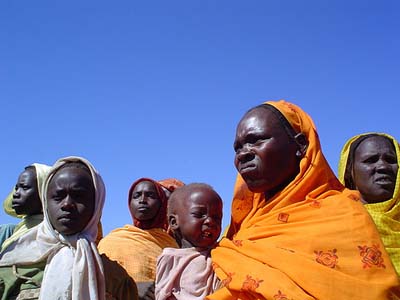March 8 marks the 100th anniversary of International Women’s Day. To commemorate the achievements and ongoing challenges women face in some of the world’s most devastating conflicts, Enough is publishing profiles each day this week of women doing exceptional work to end atrocities and support survivors in Congo, Sudan, and LRA-affected territory.

“Keeping Their Memories Alive”
Tehani Ismail, a Darfuri woman, was born and raised in Nyala, the capital of South Darfur. Tehani’s parents separated when she was young so she was raised by her single mother. The eldest of three sisters, Tehani was studying at the University of Khartoum when the violence in Darfur erupted. As reports of the violence reached Khartoum, Tehani and her Darfurian classmates in Khartoum sat paralyzed listening to the news stories.
With her family and friends still in Nyala, Tehani decided to go home and see with her own eyes what was happening. She traveled to Nyala and volunteered to work with a local organization. On her first field visit with the group, Tehani and her colleagues traveled by car to the countryside just north of Nyala. Tehani recalled that when she had been there before the war, it was the lushest area of South Darfur. “It was a place where any crops grew and all animals grazed.” But this time, when they arrived, the area was still smoldering from the fires. They encountered dead bodies of men, women, and children strewn everywhere and homes completely ransacked. There were very few survivors of the attack. They encountered burned village after burned village until they reached Muhajiriya, where they saw signs of life again.
When they reached Muhajiriya, Tehani remembers being overwhelmed by what she had seen. “What happened to the people, animals, and land that she had always remembered?” She then realized that “this is not just collateral damage of warfare but rather systematic killing of people and a violation of their human rights. If the people of Darfur aren’t aware of their rights,” she concluded, “then the government of Sudan could keep violating them.”
That was Tehani’s Enough Moment. She decided she would forgo getting a four-year university degree and would work with an organization to raise awareness and educate her fellow Darfuris about their human rights.
Tehani joined the Sudan Social Development Organization, or SUDO, as a human rights worker in 2004. SUDO is dedicated to the promotion of human rights and international development. While at SUDO, Tehani faced harassment and watched her colleagues disappear to detention centers. Sudanese government security agents had begun targeting SUDO staff and shutting down their operation since 2003. Intimidation tactics used by Sudan security operatives included going to Tehani’s mother and sister and advising them that they should tell her that “what she is doing is dangerous and her safety is not guaranteed.” Both Tehani and her mother, a public health worker, were prevented from going to work by the security officials.
In spite of this, Tehani continues to be a human rights advocate and is now a correspondent for Radio Dabanga in Nyala. Tehani is currently mobilizing women’s groups in South Darfur. The groups have established the Riaheen el-Salam for Maternity and Childhood Center, and it is focused on addressing gender-based violence. Tehani notes she has seen the “worst of the worst” cases in her work: women who were raped, who have lost everything, and who must begin picking up the pieces of their lives. Tehani now documents their cases and provides counseling and comfort so they can begin the healing process. Several of Tehani’s close friends have died because of the violence in Darfur. Initially, Tehani was always thinking of her lost friends while doing her work and constantly searching for ways to keep their memories alive. Tehani has found the best way is to work with the survivors.
Other profiles in this International Women’s Day series: Lynn Nottage, Chouchou Namegabe, Melissa Fitzgerald
The profiles highlighted in this series were compiled for The Enough Moment, a book by John Prendergast and Don Cheadle about engaged citizens – known and unknown, in the U.S. and abroad – who are mobilizing to help end genocide, rape, and the use of child soldiers in Africa. Visit the Enough Moment Wall to hear people describe their “Enough moment” and to upload a video, photo, or written testimonial of your own.

